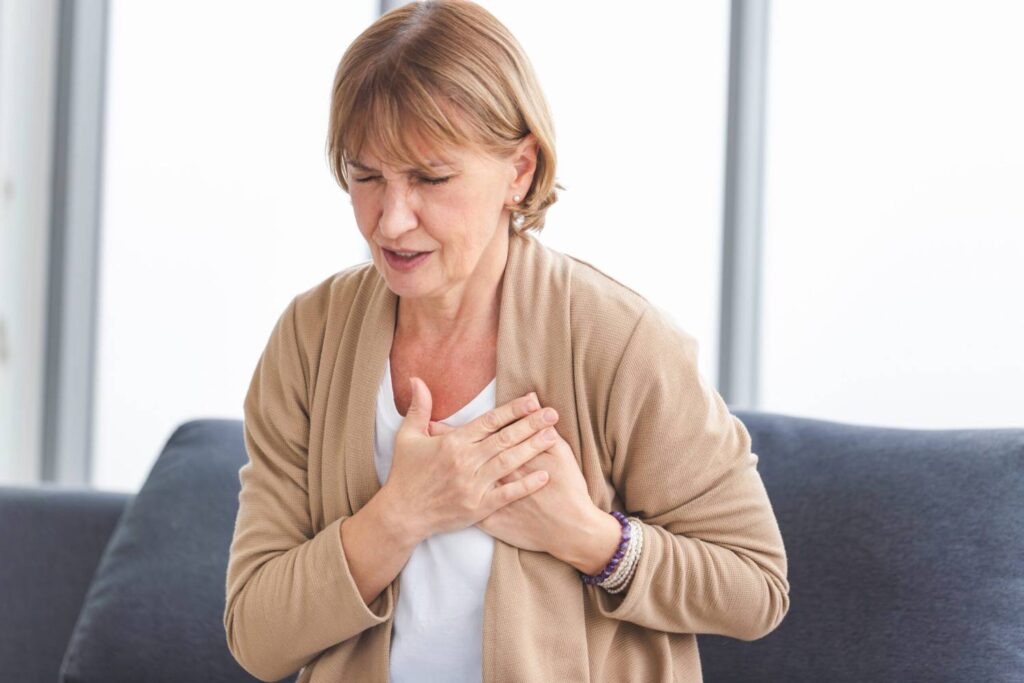Heart problems can be deadly for both men and women, or really anyone for that matter. But here’s the thing—women often experience heart disease symptoms differently than men, making it harder to recognize the early signs. Too often, women dismiss symptoms like fatigue, nausea, or shortness of breath as normal everyday issues. The reality is, that these could be warning signs of something much more serious.
Heart disease is the leading cause of death for women, and yet many don’t realize how common and preventable it is.
In this blog, we’ll explore the first signs of heart disease in women, why they might go unnoticed, and what steps you can take to protect your heart. Recognizing the symptoms early can make all the difference in taking action to safeguard your health.
How Heart Disease Affects Women Differently?
Heart disease doesn’t look the same for everyone, and for females, the symptoms and risk factors can be very different from men. Women are more likely to experience atypical symptoms, like back pain, jaw pain, or nausea, which are often mistaken for other conditions.
This leads to misdiagnosis or underdiagnosis, meaning heart problems in women might not be detected until they’re more advanced.
Unique Risk Factors for Females
- Hormonal Changes: Estrogen helps protect the heart, but when women go through menopause, the drop in estrogen levels increases the risk of heart disease.
- Pregnancy Complications: Conditions like gestational diabetes, high blood pressure, or preeclampsia during pregnancy can increase the risk of heart disease later in life.
- Menopause: After menopause, women often experience changes in cholesterol levels, blood pressure, and body fat, all of which can contribute to heart disease.
These factors make it essential for women to recognize the signs and understand their unique risks, so they can take early action in preventing heart disease.
Common Early Signs of Heart Disease in Women

Unlike men, who may experience more classic chest pain, women are more likely to show a variety of early signs that can be confused with other health issues. Recognizing these early warning signs is key to getting timely help.
Chest Pain or Discomfort
While chest pain is the most recognized symptom of heart disease, women might experience it differently than men. It could feel more like discomfort, pressure, or tightness, and may not always be in the center of the chest. Sometimes, the pain may radiate to the neck, jaw, back, or arms.
Fatigue
Feeling unusually tired or exhausted, even after a full night’s sleep, can be an early sign of heart disease. Women often report feeling tired or worn out, especially during physical activities or in the days leading up to a heart problem.
Shortness of Breath
This can occur without exertion or even during rest. Women with heart disease may notice a persistent feeling of breathlessness that doesn’t improve, especially when engaging in light activity or during the night.
Nausea or Indigestion
Women are more likely to experience nausea, indigestion, or heartburn as early signs of heart disease. These symptoms might be mistaken for a digestive issue rather than a heart-related problem.
Lightheadedness or Dizziness
Feeling lightheaded or faint, especially when standing up quickly, can be a sign of reduced blood flow to the heart. This symptom, often linked to heart disease, may be accompanied by a racing heartbeat.
Cold Sweats
Women may experience sudden sweating or cold sweats even without physical exertion. This can be a warning sign that your heart is not getting enough oxygen or blood.
Pain in the Back, Neck, or Jaw
In females, the pain from heart disease is often felt in places like the back, neck, or jaw, rather than just the chest. These subtle pain signals can easily be ignored or attributed to muscle strain or tension.
Because these symptoms may not be as dramatic or specific as classic chest pain, women often dismiss them, thinking it’s just stress or something less serious. However, recognizing them early is crucial for reducing the risk of severe heart problems. If you experience any of these symptoms, it’s important to seek medical advice promptly.
If you’re experiencing any of these symptoms or are concerned about your heart health, don’t wait.
Get connected with top cardiologists today via video consultation. You can also get digital prescriptions, order medicines, book doctor appointments, schedule lab tests, and find doctors near you. Plus, you can ask a free health question to our experts.
📞 Click here to consult a cardiologist today and take charge of your heart health!
Consult Online Cardiologist
Why Women Are at Higher Risk of Getting Heart Problems
 Here are the key factors that put women at a higher risk:
Here are the key factors that put women at a higher risk:
1. Hormonal Changes
As women age and go through menopause, the body’s production of estrogen decreases. Estrogen helps protect the heart by keeping cholesterol levels in check and promoting healthy blood vessels. Without this natural protection, women are at a higher risk of developing heart disease.
2. Pregnancy Complications
Certain pregnancy-related conditions, such as gestational diabetes, high blood pressure, and preeclampsia, can increase a woman’s risk of heart disease later in life. These conditions can lead to vascular damage and high blood pressure, both of which contribute to heart problems.
3. High Blood Pressure
High blood pressure, or hypertension, is more common in women after menopause. This condition can lead to increased strain on the heart, making it more difficult for the heart to pump blood effectively, and increasing the risk of heart attack and stroke.
4. Stress and Mental Health
Women are more likely to experience stress, anxiety, and depression, all of which can contribute to heart disease. These mental health conditions can lead to increased blood pressure, unhealthy eating habits, poor sleep, and physical inactivity, all of which raise the risk of heart problems.
5. Family History
A family history of heart disease can increase the likelihood of heart problems, especially for women. If a woman has a close relative (such as a mother or sister) who experienced heart disease at a young age, she is at a higher risk of developing similar issues.
6. Smoking
While smoking is a risk factor for both men and women, it tends to have a more significant impact on women’s heart health. Women who smoke have a higher risk of developing coronary artery disease, and smoking can also interfere with estrogen production, further increasing the risk.
Due to these factors, women must be proactive in managing their heart health by focusing on lifestyle changes, maintaining a healthy diet, exercising regularly, and managing stress. Early detection and regular check-ups are key to reducing the risk of heart disease.
How Heart Attack Symptoms in Women Often Differ from Those in Men
Here’s a quick comparison of how heart attack symptoms in women differ from those typically experienced by men:
| Symptom |
Women |
Men |
| Chest Pain |
Discomfort, tightness, or pressure, often not as intense as in men. |
Sharp, intense chest pain. |
| Pain in Other Areas |
Pain may radiate to the back, neck, jaw, shoulders, or upper stomach. |
Pain is typically centered in the chest. |
| Shortness of Breath |
Common symptom, can occur without chest pain. |
May experience shortness of breath, but often alongside chest pain. |
| Nausea/Vomiting |
More frequent, often mistaken for stomach issues. |
Less common but can occur. |
| Fatigue |
Unusual fatigue or weakness, even without exertion. |
Fatigue is less common, but may occur. |
| Sweating/Dizziness |
Cold sweats and dizziness are common. |
Sweating and dizziness occur but are less frequent. |
| Unusual Symptoms |
Indigestion, fullness, anxiety, or feeling of impending doom. |
Chest pain with no additional symptoms. |
Important: Females may experience atypical symptoms that are often dismissed as unrelated to heart issues, making it harder to recognize a heart attack. If any of these symptoms occur, it’s critical to seek medical attention right away.
Prevention and Early Detection of Heart Disease in Females
Heart disease is largely preventable, and making a few lifestyle changes can significantly reduce the risk for females. Early detection through regular check-ups and understanding key health indicators is also essential in managing heart health.
Eat A Healthy Diet
- A heart-healthy diet can go a long way in reducing your risk.
- Focus on eating fruits, vegetables, whole grains, lean proteins, and healthy fats like those found in avocados, olive oil, and nuts.
- Limiting sodium, processed foods, and added sugars will help manage cholesterol and blood pressure, both crucial for heart health.
Regular Exercise
- Aim for at least 150 minutes of moderate-intensity exercise each week.
- Activities like walking, jogging, cycling, or swimming help maintain a healthy weight, lower blood pressure, and improve circulation, all of which reduce heart disease risk.
Stress Management
- Chronic stress is a significant risk factor for heart disease.
- Relaxation techniques such as yoga, deep breathing, and meditation can help manage stress levels.
- Regular physical activity is another great stress reliever, so combining exercise with relaxation practices can benefit both your body and mind.
4. Regular Health Check-ups
- Regular screenings are essential to detect heart disease early, especially for women who might not experience classic symptoms.
- Key screenings include checking your blood pressure, cholesterol levels, blood sugar, and BMI.
By focusing on healthy eating, regular physical activity, stress management, and staying on top of your health screenings, you can reduce your risk of heart disease and improve your long-term heart health.
Conclusion
Taking charge of your heart health today can significantly impact your well-being tomorrow. Making simple lifestyle changes, going for regular health check-ups, and knowing your key health numbers—such as blood pressure, cholesterol, blood sugar, and BMI—are essential in detecting potential problems early and preventing heart disease before it starts.
Don’t wait for symptoms to worsen. It’s never too early to take action, especially when it comes to protecting your heart. If you’re concerned about your heart health or need guidance, then visit and get connected with a cardiologist today for expert advice and early detection.



 Here are the key factors that put women at a higher risk:
Here are the key factors that put women at a higher risk: